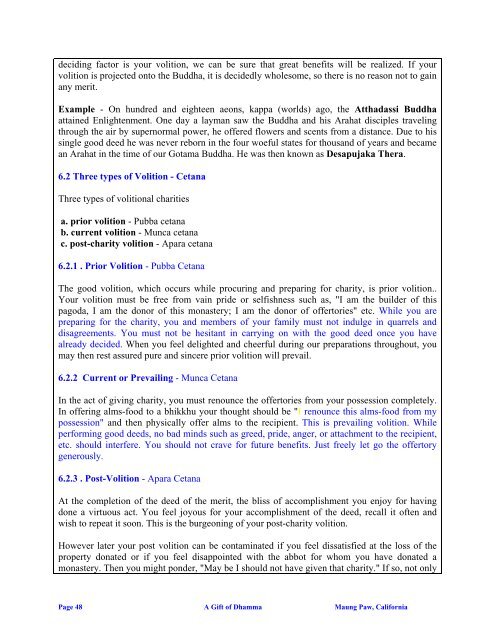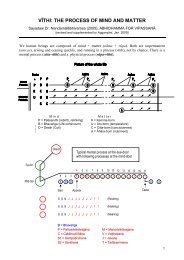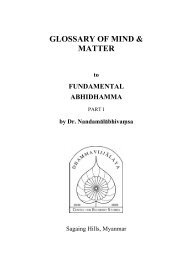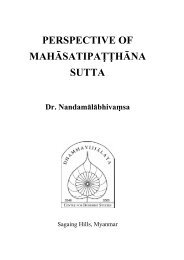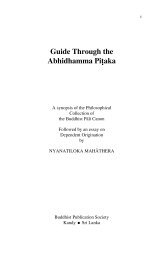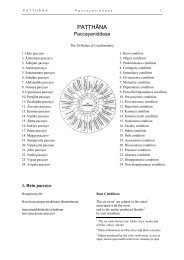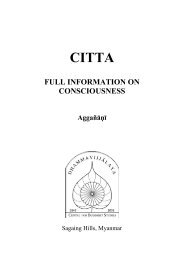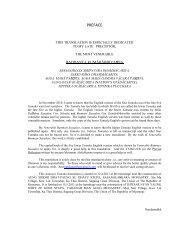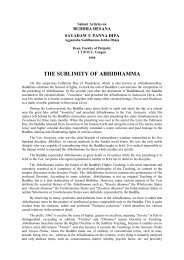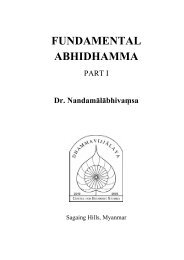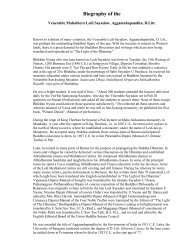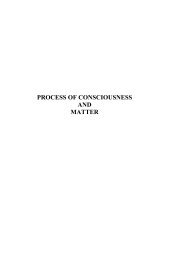ABHIDHAMMA IN DAILY LIFE - Abhidhamma.com
ABHIDHAMMA IN DAILY LIFE - Abhidhamma.com
ABHIDHAMMA IN DAILY LIFE - Abhidhamma.com
You also want an ePaper? Increase the reach of your titles
YUMPU automatically turns print PDFs into web optimized ePapers that Google loves.
deciding factor is your volition, we can be sure that great benefits will be realized. If your<br />
volition is projected onto the Buddha, it is decidedly wholesome, so there is no reason not to gain<br />
any merit.<br />
Example - On hundred and eighteen aeons, kappa (worlds) ago, the Atthadassi Buddha<br />
attained Enlightenment. One day a layman saw the Buddha and his Arahat disciples traveling<br />
through the air by supernormal power, he offered flowers and scents from a distance. Due to his<br />
single good deed he was never reborn in the four woeful states for thousand of years and became<br />
an Arahat in the time of our Gotama Buddha. He was then known as Desapujaka Thera.<br />
6.2 Three types of Volition - Cetana<br />
Three types of volitional charities<br />
a. prior volition - Pubba cetana<br />
b. current volition - Munca cetana<br />
c. post-charity volition - Apara cetana<br />
6.2.1 . Prior Volition - Pubba Cetana<br />
The good volition, which occurs while procuring and preparing for charity, is prior volition..<br />
Your volition must be free from vain pride or selfishness such as, "I am the builder of this<br />
pagoda, I am the donor of this monastery; I am the donor of offertories" etc. While you are<br />
preparing for the charity, you and members of your family must not indulge in quarrels and<br />
disagreements. You must not be hesitant in carrying on with the good deed once you have<br />
already decided. When you feel delighted and cheerful during our preparations throughout, you<br />
may then rest assured pure and sincere prior volition will prevail.<br />
6.2.2 Current or Prevailing - Munca Cetana<br />
In the act of giving charity, you must renounce the offertories from your possession <strong>com</strong>pletely.<br />
In offering alms-food to a bhikkhu your thought should be "I renounce this alms-food from my<br />
possession" and then physically offer alms to the recipient. This is prevailing volition. While<br />
performing good deeds, no bad minds such as greed, pride, anger, or attachment to the recipient,<br />
etc. should interfere. You should not crave for future benefits. Just freely let go the offertory<br />
generously.<br />
6.2.3 . Post-Volition - Apara Cetana<br />
At the <strong>com</strong>pletion of the deed of the merit, the bliss of ac<strong>com</strong>plishment you enjoy for having<br />
done a virtuous act. You feel joyous for your ac<strong>com</strong>plishment of the deed, recall it often and<br />
wish to repeat it soon. This is the burgeoning of your post-charity volition.<br />
However later your post volition can be contaminated if you feel dissatisfied at the loss of the<br />
property donated or if you feel disappointed with the abbot for whom you have donated a<br />
monastery. Then you might ponder, "May be I should not have given that charity." If so, not only<br />
Page 48 A Gift of Dhamma Maung Paw, California


